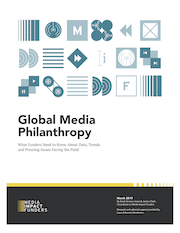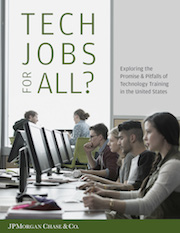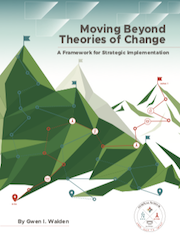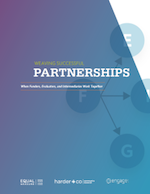Site Search
- resource provided by the Forum Network Knowledgebase.
Search Tip: Search with " " to find exact matches.
Mismatched: Philanthropy’s Response to the Call for Racial Justice is the most comprehensive assessment of racial equity and racial justice funding to date, providing a detailed analysis of funding from 2015–2018 and a preliminary analysis for 2020. Written by Malkia Devich Cyril, Lyle Matthew Kan, Ben Francisco Maulbeck, and Lori Villarosa, the report examines trends, contradictions, and divergences in funding for both racial equity and racial justice work.

With support from the Bill & Melinda Gates Foundation, Media Impact Funders has been researching trends, challenges and opportunities for global media funding. The research in this report draws on a variety of sources: data from the media data map through 2015, results from a survey of leading organizations engaged in funding media-related projects around the world, analyses of existing literature and reports, and insights offered by experts across a range of media funding issues.

In the past few years, training programs promising on-ramps to high-paying tech jobs have sprung up across the country, drawing attention from the media, government leaders, and the general public. The rapid growth of these new models for tech training – often designed to fill the projected growth in information and communication technology (ICT) jobs – raises questions about how best to classify and understand these programs and their role and value in workforce development more generally.
This report examines the reasons for the tech training hype and proposes a taxonomy of training programs, cataloging best practices from each program type. The report also identifies challenges that organizations, employers, and the government will need to address to ensure these expanding programs accurately meet market demand and look to the future of tech training more generally.
CSR executives have difficult jobs. They are expected to be strategic, aligned with business priorities, and focused on results. Yet success often requires navigating ever-changing expectations and a maze of competing priorities.
This strategy toolkit, developed in partnership with CECP, identifies three tools for clarifying your strategy and transforming your portfolio.
- Intent Matrix: Helps you to develop a customized map of your business motivations and engagement approaches.
- Issue Monitor: A dynamic and multi-dimensional process for prioritizing your issues.
- Impact Models: Four clear and distinct options for engaging your chosen issues.
The Devils Youth Foundation, in an effort to bring life-changing opportunities to New Jersey’s youth through the power of sports and entertainment, recently committed its largest-ever grant, $100,000, to foundation partner La Casa de Don Pedro.
The grant provides the La Casa de Don Pedro facility with a brand new “El Patio de La Casa” — a revitalized area to serve as a vibrant community hub modeled after a Caribbean Plaza with safe spaces for children to play, attend concerts, have a neighborhood communal refrigerator and enjoy festivals.
El Patio de La Casa’s subsequent community programming will serve over 800 youth in Newark annually.
A corporate member queried the corporate listserve which technology tools they use for their corporate giving system/platform. CNJG compiled the responses and combined it with previous responses from other technology systems queries to create this list of “Who Uses What Technology Systems.” If your organization is not listed, please email the names of those systems to Craig Weinrich.
Community colleges offer greater affordability than private or state colleges, are adept at providing flexible education schedules and delivery, and are often deeply tied to the local areas in which they reside. This type of accessibility and inclusivity provides enormous opportunities for students left out of traditional higher education models. And while there is a road to recovery for community colleges post-COVID, they can play a critical role in building a future workforce in local communities and creating a more equitable higher education system for New Jersey students.
During this program, we’ll hear from several community college leaders on the impact of the pandemic on enrollment and learning, the biggest challenges facing higher education right now, and the opportunities they see to close education gaps and improve student outcomes. Join us to learn more about community colleges as a pathway to success for students in New Jersey, and philanthropy’s role in supporting more accessible, affordable, and flexible higher education models.
Speakers include:
Brian Bridges, Ph.D., Secretary of Higher Education, State of New Jersey
Dr. Michael Gorman, President, Salem Community College
Steven M. Rose, President, Passaic Community College
Cost: Free for CNJG Members; $50 for Non Member Grantmakers.
This program is only open to staff and trustees from grantmaking organizations.
Webinar Video
This “How to Collect and Share DEI Data” guide is a resource for the field and has been written with nonprofits who want to start collecting their organization’s data in mind. The questions and choices of answers have been carefully considered with expert partners – CHANGE Philanthropy, Equity in the Center, and RespectAbility.

Effecting systemic change through philanthropic initiatives requires not only a strategy but a well-constructed implementation plan focused on "people, partners, and platforms.” According to a new report, Moving Beyond Theories of Change: A Framework for Strategic Implementation, philanthropic organizations hoping to achieve impact must align the partners, approaches, and organizational commitments before they begin to design programs, issue Requests for Proposals, or even hire staff. The report further suggests frameworks should include diversity, equity, and inclusion (DEI) efforts and partnerships with intermediaries and donor collaboratives.

This report is designed to inform stakeholders in complex change strategies involving multiple partners, funders, intermediaries, and evaluators. It is framed by a literature review on partnership structures, trust building, and developing a learning culture, and offers case studies of three different partnerships. The report was commissioned by The James Irvine Foundation and collaboratively developed by Equal Measure, Engage R+D, and Harder+Company Community Research.
The Foundation is seeking a Senior Associate, Research & Impact to join its Strategic Impact and Learning (SIL) team to assess and build evidence about the ROI of the Foundation’s grantmaking. Reporting to the Research & Impact Officer, the Senior Associate will collaborate closely with the Program team to analyze, benchmark, and communicate the impact and cost-effectiveness of grant strategies and investments to inform data-driven decisions.
